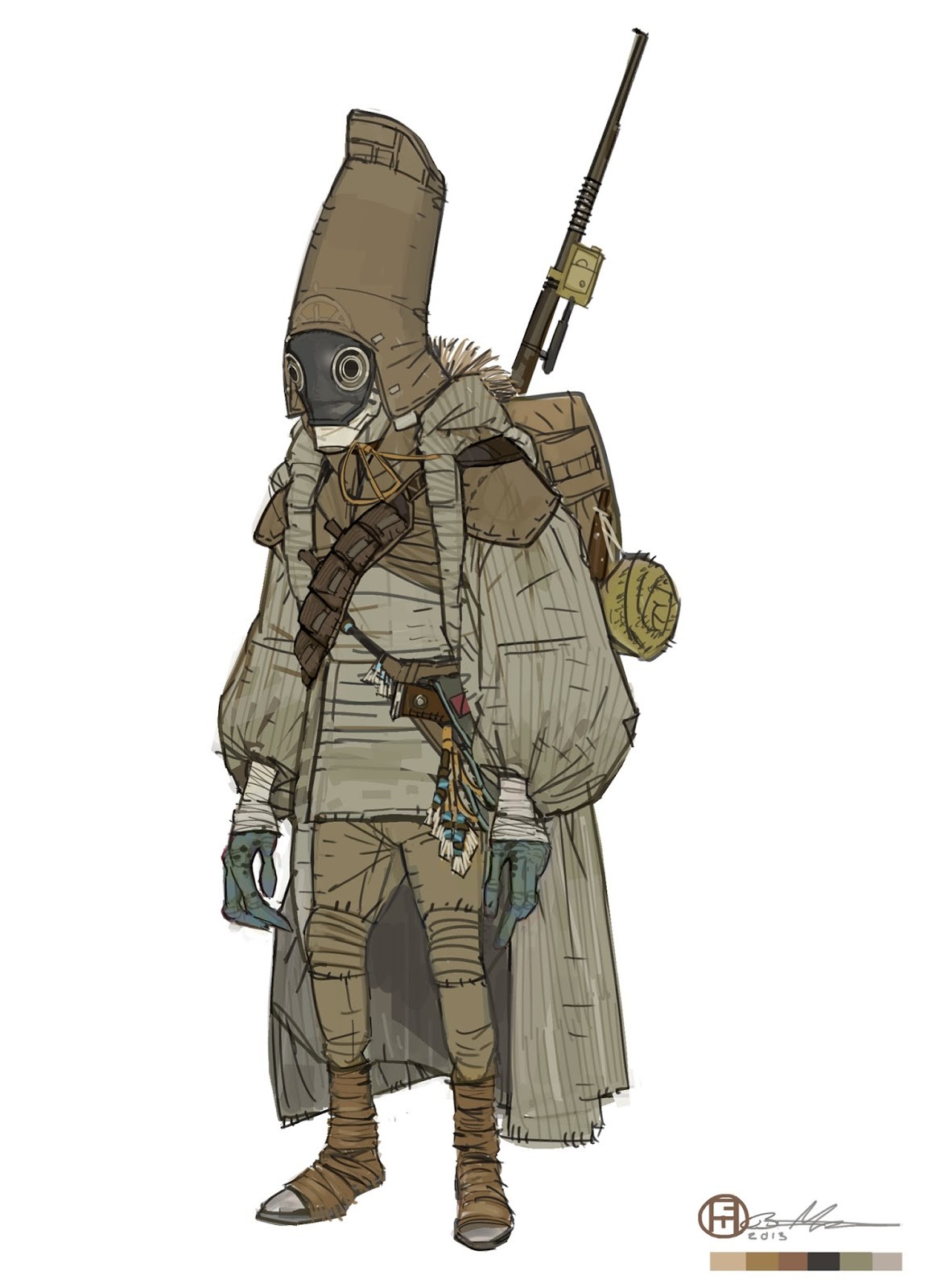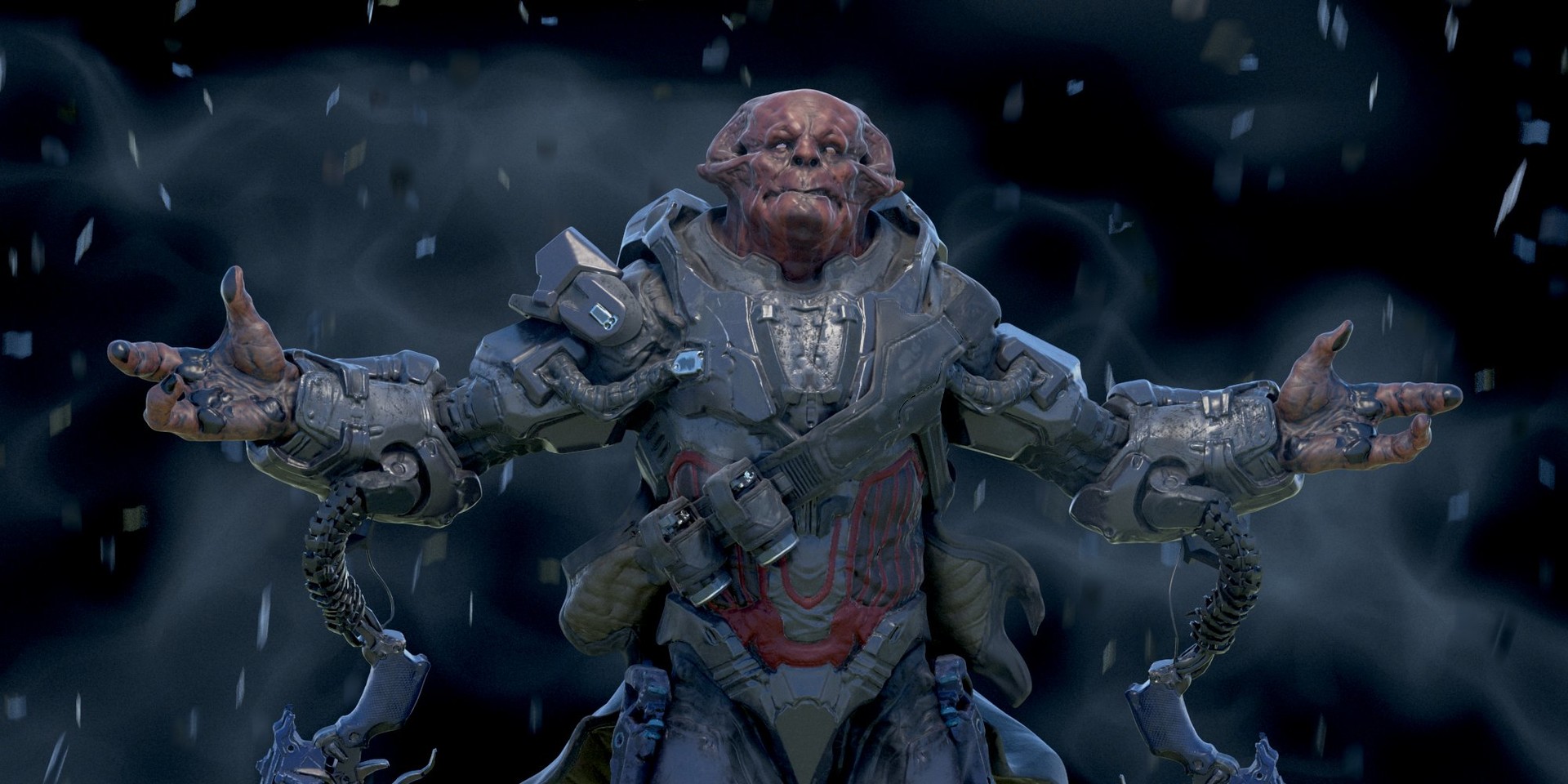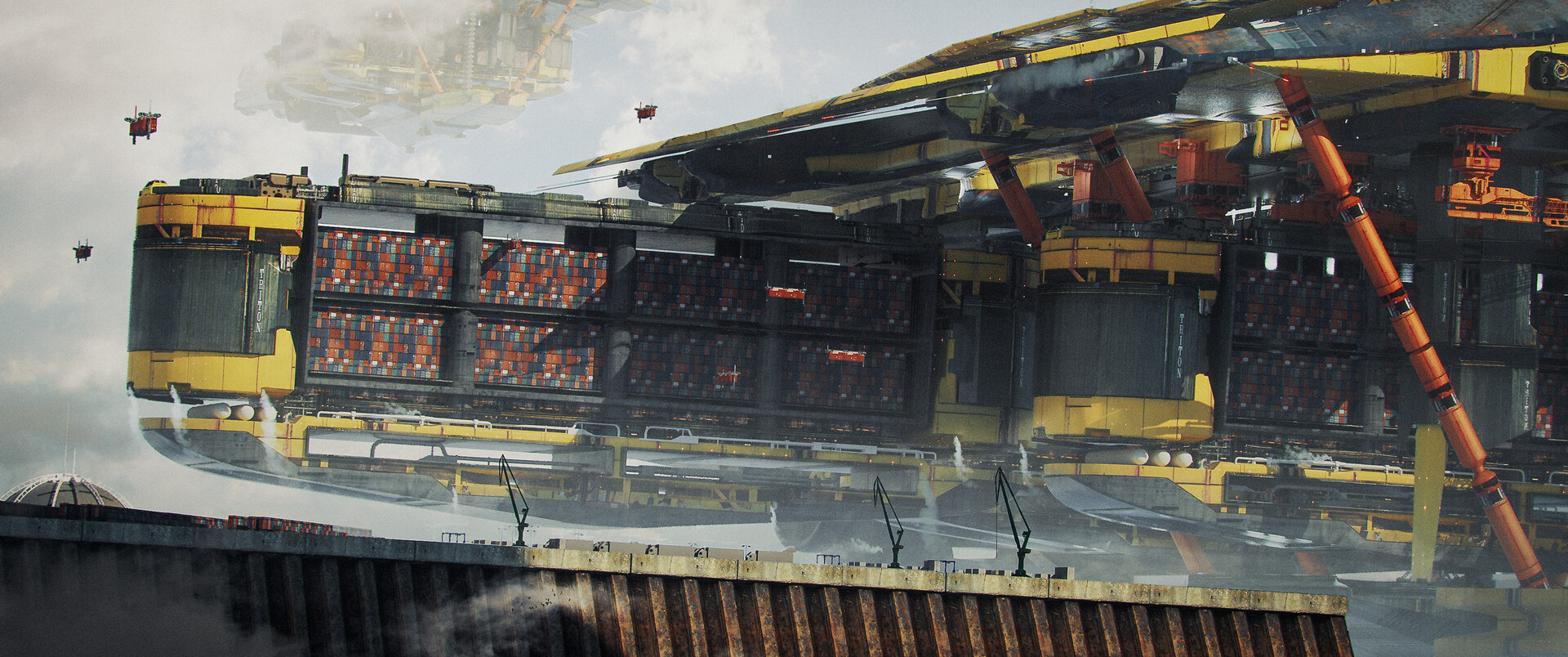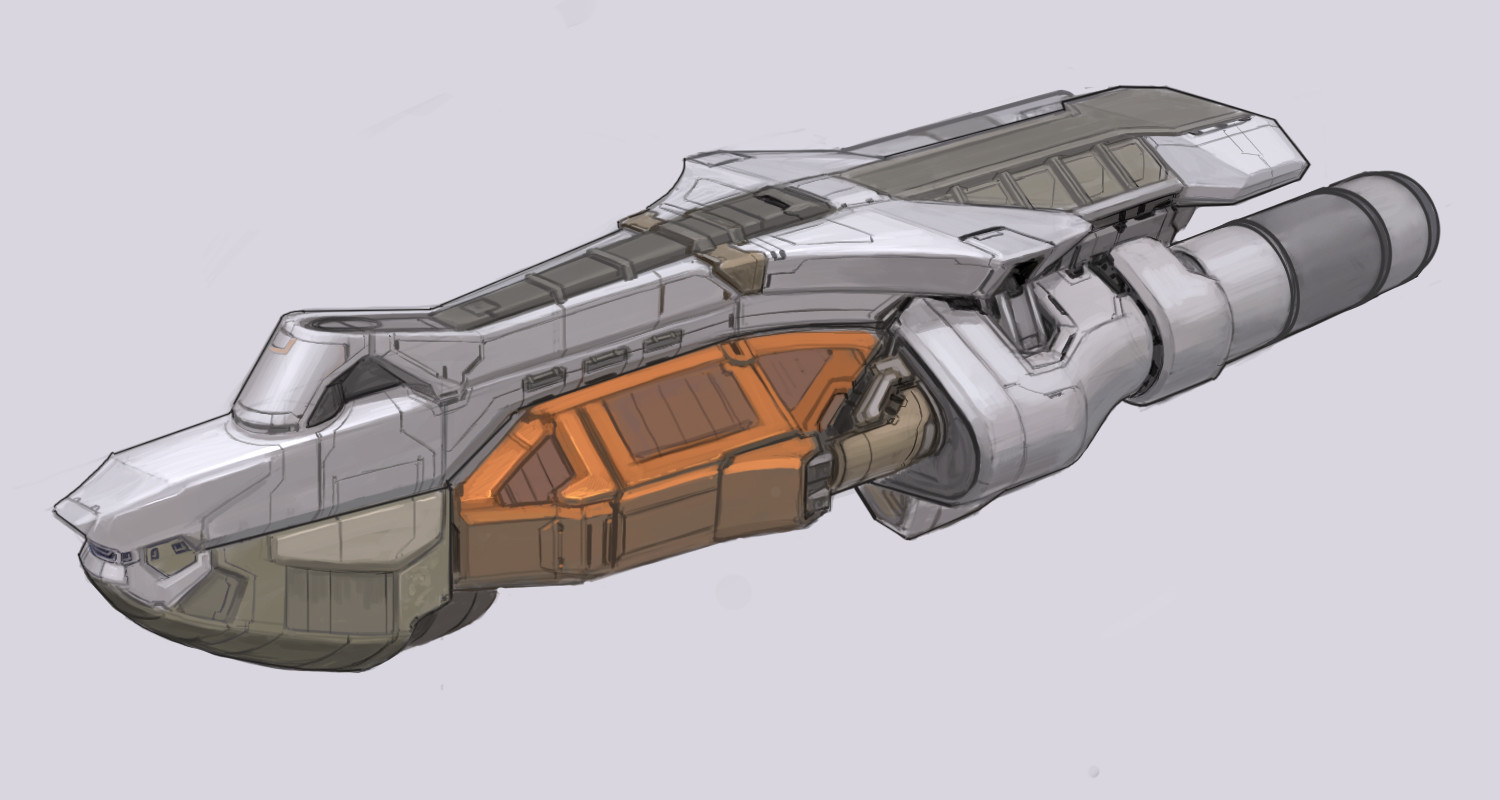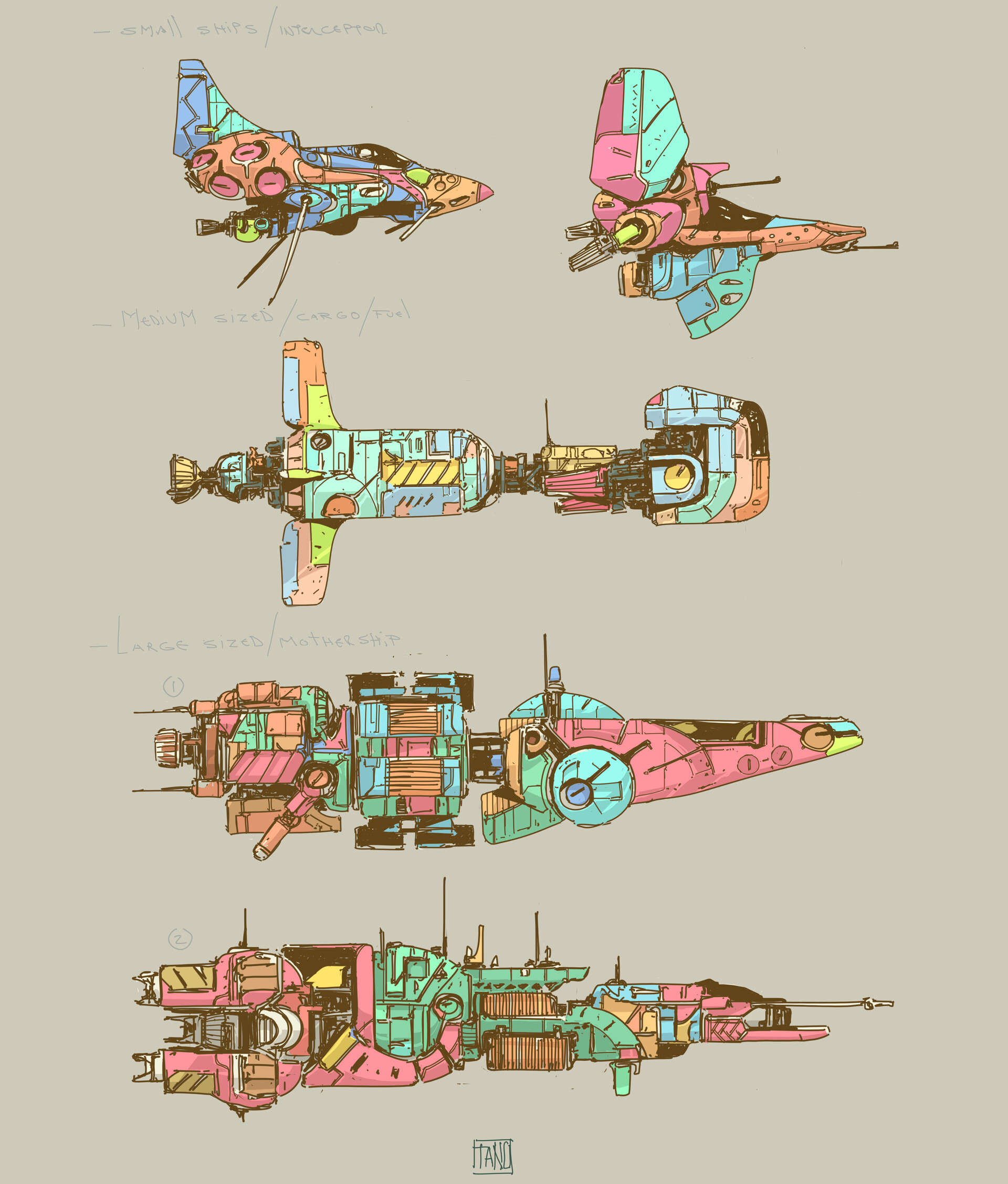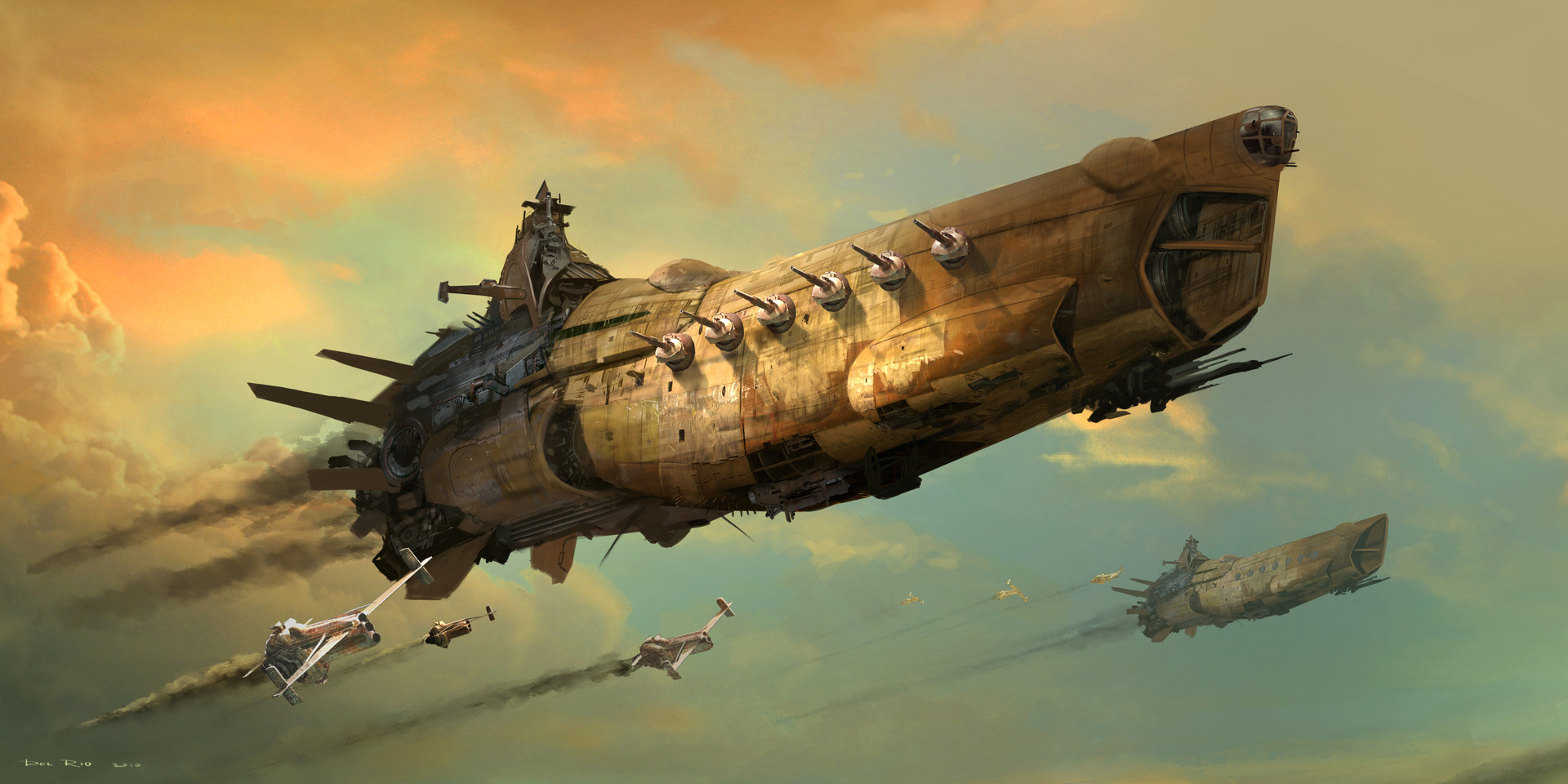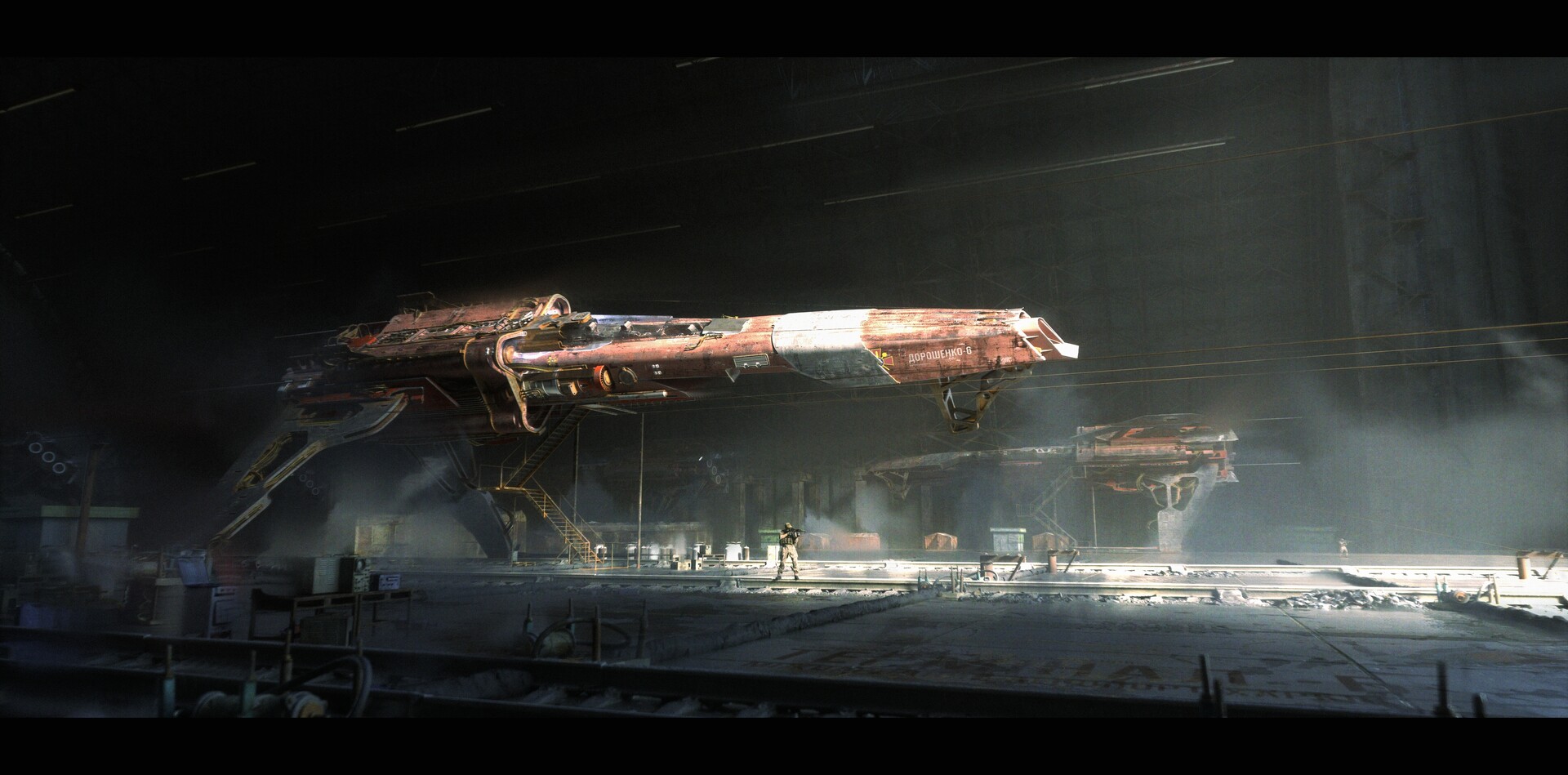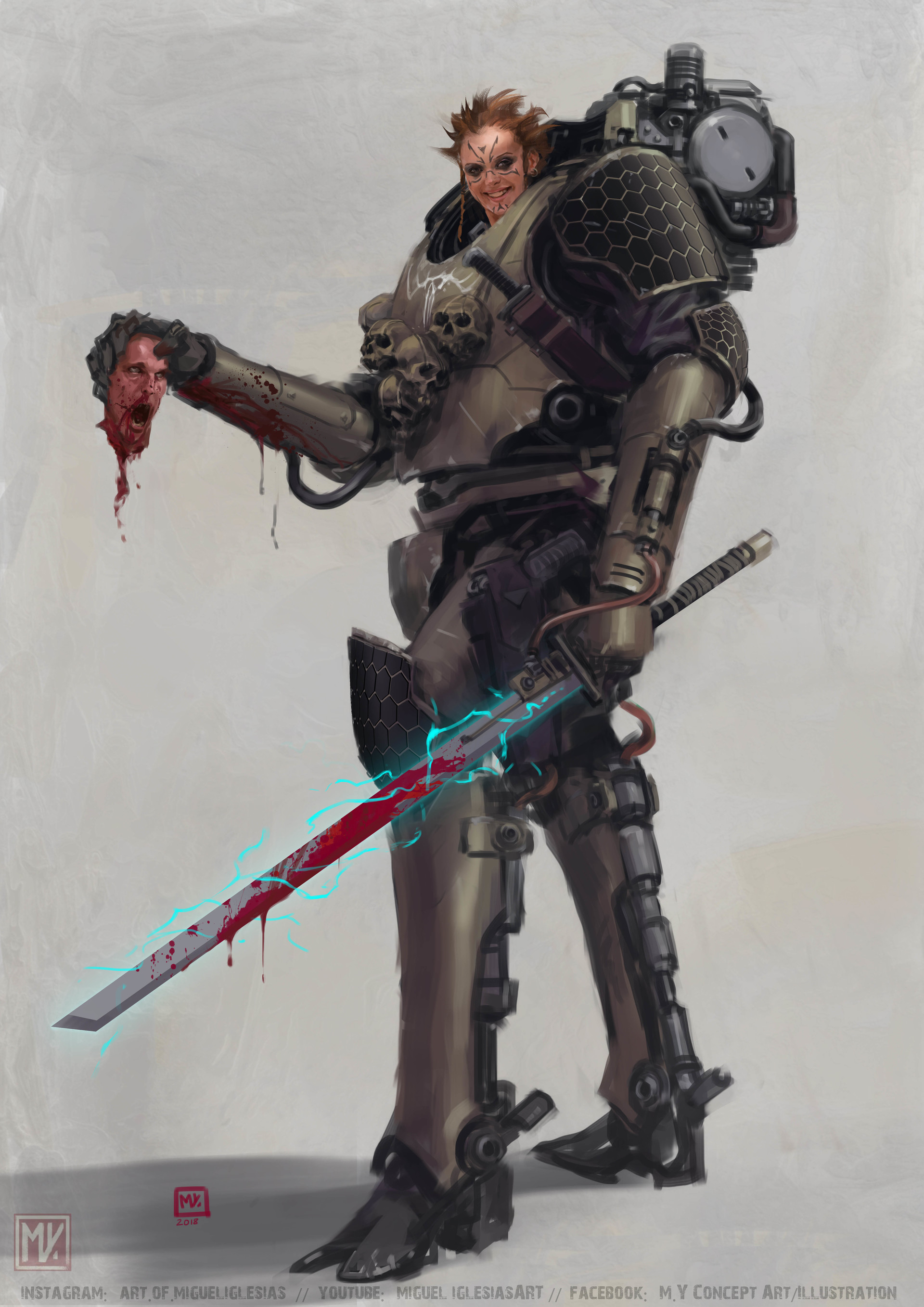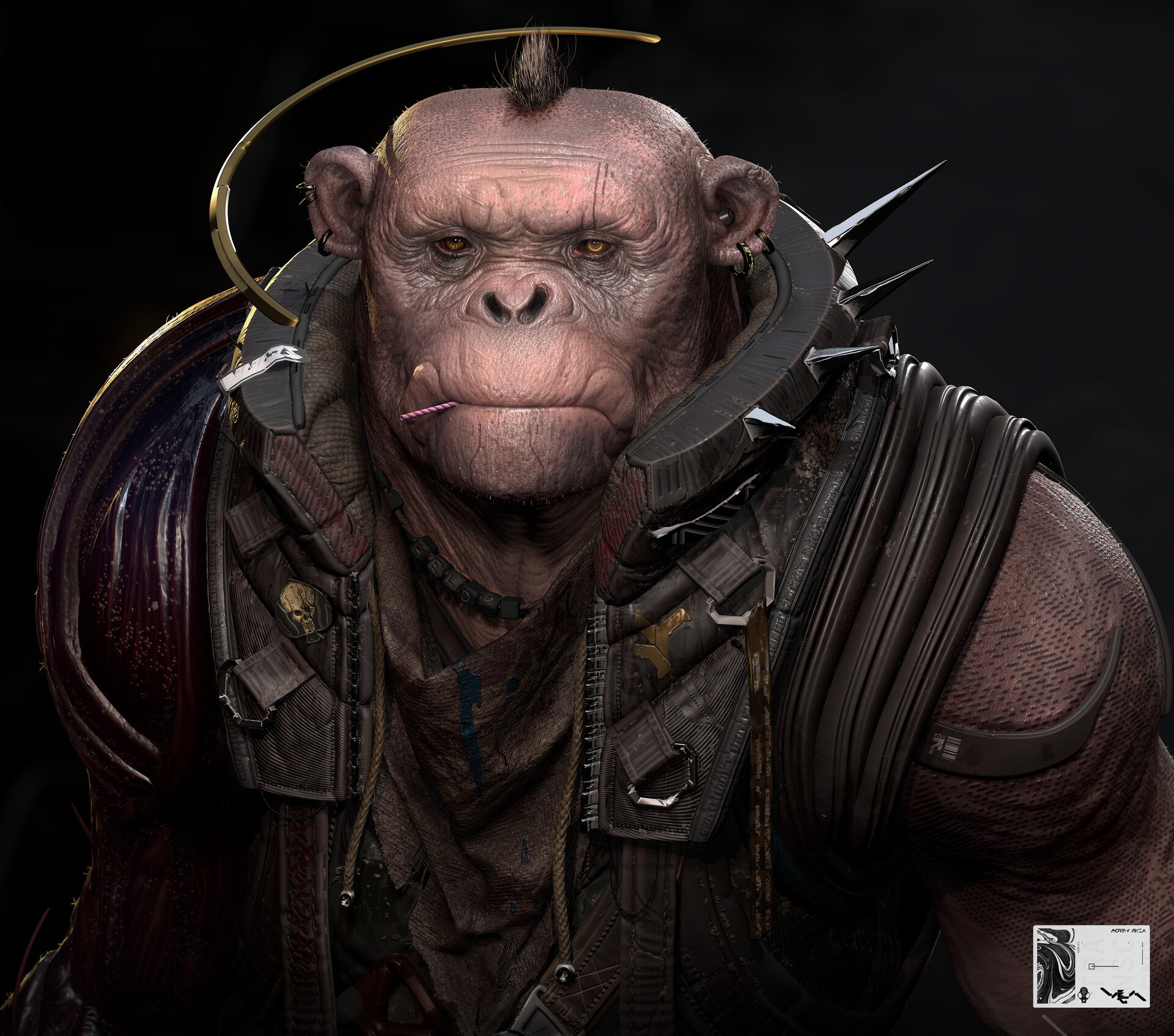Any thoughts on what you'll be making?
AdorableSaucer
 Member
Member
Based and RPilled
- Last Seen: 1 mo ago
- Joined: 6 yrs ago
- Posts: 366 (0.16 / day)
- VMs: 0
-
Username history
- AdorableSaucer 6 yrs ago
-
Latest 10 profile visitors:
-
Most recent →
 Kangutso,
ShiningAsh,
Kangutso,
ShiningAsh,
 Lord Zee,
Lord Zee,
 Dinh AaronMk,
Dinh AaronMk,
 Timemaster,
Timemaster,
 Lunamaria Hawke,
Lunamaria Hawke,
 Taeryn,
Taeryn,
 Nallore,
Nallore,
 Sigma,
Sigma,
 ButtsnBalls
ButtsnBalls
Status
User has no status, yet
Bio
User has no bio, yet
Most Recent Posts
@Dark Cloud I wish I could claim to be the mind behind lucky, unfortunate ogres. xD I'm happy you like them!
@Dark Cloud Sure, can do that. Would you like the full post?
@Dark Cloud Oh, gotcha, that's fair.
@Dark Cloud Welcome aboard, fam! Hop into the discord if you'd like! Kinda empty there atm, but that just makes it cozier.

Welcome to this Post-Apocalyptic Civilization RP!
Acknowledgements: I would very much like to thank @Chenzor and @Cyclone for allowing me to use their nation RP concept for this iteration.
Join us at our discord-server: discord.gg/cfnv8tkFMC
Status: Full!
Basic Rundown:
Civilisation is a turn-based character/nation RP with stats and actions which are used to guide the narrative, but not control it. You will be presented with choices on how to advance your colony. Every turn, your population grows (maybe) and you are presented with new choices and sometimes hardships. Do your best to delay your colony’s collapse and you might even be able to prosper in the Collapsed World. Best of luck!
The roleplay begins with a group of your people reemerging from some sort of safe room after a terrible apocalypse destroyed the world. What the nature of this apocalypse was, has been long forgotten. A great war? A meteorite? Climate change? The Rapture? Whatever it was, the world now is unlike anything ever experienced in the planet’s history. Your people are few and your supplies are low. Perhaps you are the descendants of a wealthy subset of the Old World population that could afford a proper bunker? Perhaps your people hid in ancient caves or built improvised shelter to fend off as much of the damage as possible? Maybe your people was one of the many unfortunate ones who couldn’t find shelter in time, but somehow survived due to terrible mutations? Or maybe, just maybe, you have come here from a distant land, one that was even more broken than this one? Whatever you are and wherever you are from, you must find ways to adapt, survive and maybe even thrive here. You know very little of these lands.
Most certainly there are other civilizations on this continent and other races that may become your allies or enemies, but you do now yet know.
Your options each turn are these:
A) Improve food
B) Improve military technology
C) Improve infrastructure
D) Improve culture
E) Explore
F) Improve resources/technology
G) Prospect further
H) Expand military
I) Take diplomatic action
X) Other
Furthermore, these stats will be shown every new turn:
Population: – How large your combined population is, as well as demographics. Lists each settlement once you get more than 1. Affected by growth and food level and so on.
Military: – How large your professional army is, as well as how many commoners can be drafted to militia in a crisis. A certain wealth and food level threshold must be surpassed to maintain a professional army.
Food level: – How much food you have to go around. Will affect morale and growth where a surplus will lead to happier people and faster growth.
Resources: – A list of resources you are harvesting and thus available to you to use or export.
Wealth: – How wealthy you are considered to be. Not all races care about bling, though.
Trade: – With whom you are trading and what you’re importing/exporting.
Growth: – A percentage of your total population will increase or decrease depending on if your growth is good or bad. An average growth increase per turn is 3%, good growth 5%, bad growth 1%, and so on. Growth is affected by food level, morale, biome and population level.
Morale: – Ranging from 0% to 100%, morale affects combat, growth and general well-being events of your people. A content (average) populace is considered 100%.
Foreign relations: - Displays a list of other civilizations you have met and how well you like each other.
Each action from A to I present different opportunities and different consequences (good and bad). You may choose one of these per turn and preferably write up a post about how you, for example, "Improve food". Depending on how good and thought-out your post is, you may combine one choice with another. For example, while improving your "food", you discover how to create farms and thus also improve your infrastructure in the process. the X-action is an action of your own that is not in the list of choices from A to I. You may write and attempt whatever you want in the X-action, and I may or may not grant you what you hope for.
Lastly, every post will take place in a certain biome. The Collapsed World has many to choose from, and each affects actions taken there. There are pros and cons with every biome, and every biome has its own natural disasters and environmental hazards:
So how do I start?
Post a sheet here in the OOC, pick a starting location on the map and save yourself a spot! If the RP is full, you may choose to be put on a waiting list. If the sheet is accepted, you can go ahead and post it under Characters and start posting in the IC!
Recommended: Check out at least one of the previous iterations of this roleplay to get a hang of how it's played:
roleplayerguild.com/topics/79912-civi…
roleplayerguild.com/topics/157987-civ…
roleplayerguild.com/topics/167577-civ…
roleplayerguild.com/topics/174472-civ…
roleplayerguild.com/topics/179136-civ…
roleplayerguild.com/topics/180866-civ…
How do I join if you already started?
Make sure that there is room to join first! Below you will find a list of active players, and at the very top of the thread there should be a "status" line with either green, yellow or red text. It's either open, pending or full. Also, read the information about “So how do I start?” above.
Rules and regulations:
All roleplays have rules. You should know the basics like:
- Don't godmode.
- Don't metagame.
- Don't be rude to other players.
However, there are also some other rules you should know about:
- Never wipe a player out completely unless he or she has given his or her consent.
- Don't focus on "winning", it's about playing creating dope-ass stories and enjoying them together.
- It is okay to attack or raid another civilization freely as long as you have discovered them and scouted out the target first. Just don't expect it to always go your way.
- Don't expect to never be met with setbacks or hardships. You may all be given good and bad consequences as well as random events depending on your choices.
- As the GM, I reserve the right to have the last say in conflicts and squabbles, and while I hope I won’t have to, I will remove anyone deliberately upsetting the harmony of the RP.
Also, here are some regulations that aren't "DON'T"'s
- Non-player nations are free to be conquered, raided, wiped out or otherwise warred with however you want.
- Any questions and OOC-chat should be reserved either for the Discord or the OOC chat here.
- When plotting with a player against another player, I recommend you take it to PM to avoid metagaming. Please strive to keep as many parts informed, at least of the fact that you are plotting something.
- When plotting as mentioned above, I want to be kept in the loop as the GM, to avoid misunderstandings and to avoid conflicts OOC.
- You may otherwise choose PM or public IC post however you wish when communicating with other nations.
- If you don't want to play one civ anymore but rather want another, tell me in the OOC and I will arrange a "natural disaster" for your people or take it over as a non-player civ. Lotta ways to die out in the Outback!
- When starting over with a new civ, you will be given some bonuses to help you catch up, but not too much.
- There is no enforced limit of posts per turn; however, you may only take your A-I choices once per turn. Also, don't speedpost. We’re making stories, so it’s always nice to see meaning and depth in those posts if you decide to post several per turn (When you interact with other players, this is crucial).
Current Map
Anything not on this map is not considered official. Current turn: 0
Current Players: 5/5
1. @Dark Cloud
2. @Chenzor
3. @Dog
4. @rezay
5. [@ClocktowerEchoes]
Holding List: Accepting
1. @SilverPaw
2. @Enzayne
3.
4.
5.
Info About Custom Races:
The reason why we have a preset list of races and subraces is so that I as a GM can easily paint the world around you using my own notes and ideas that I’ve put down when creating this world. Still, I want to encourage individualism, so if you’ve got a custom race, go for it! However, it may be harder to make things up on the spot if I don’t see things the way you, the player, see things about your race. Whether you choose from the list or make your own race, I encourage you to talk about what you want with your civilization, what your hopes are, what you aim for in the RP, if there’s a specific hook that you’re going for and so on so that I can narrate accordingly and fitting your vision. That said, it’s much easier to narrate a world when you know exactly what’s in it.
Nation Sheet
For the "character" section. Entirely optional, but handy.

Breaking Bread
Year 30AA, early Winter, Ha-Dûna...
Clement du Pierre stood alone in the dark of twilight, dressed in his finest clothes and equipped with a basket of fruits, vegetables and small pots of spices. He wore a magnificent white cloak of wool, treated with felgar oil to make it resistant to the winter elements. His green linen shirt, coloured with the juice of mashed grass, needed help from a wool-reinforced vest of buffalo skin, gifted onto him by a Nubveian friend. His pants were of borak skin: thick, heavy and well-suited for the snows that would be here any day. His boots were expertly cobbled from the skin of bearfish, oddly elastic and soft despite years and years away from the sea. Atop his head, a finely waulked bonnet of goat’s wool imported all the way from the distant land of Cúibarsear, brought to Ha-Dûna through great Fìrinn’s mirror. Somehow, it sat more majestically atop his bronze-haired head than any hat of local wool.
He was alone. He had been escorted here by his cousin and her siblings - brave members of his hildargeach, but he had been asked to come alone, after all, and his word was his chain. He stood before a great door fashioned from wood - a rare sight even in Ha-Dûna. Its frame was carved beautifully with imagery depicting the tale of Jeanix Blanche’s battle of wits against the troll sorceror Mysticka, a favourite around clan Blanche hearths. Clement studied the details of the shining woman’s face and its contrasts to the demonic troll hag’s mug in the scene where Jeanix solves the sorceror’s riddle. He pondered whether he should have his own clan’s myths enshrined in wood in this manner.
The bar on the other side scraped against the inside of the door and it was pulled open, revealing the bald, smiling, mustached face of Charlix of Blanche, who took a bow and drummed his chest in salute. “Clement, my prestigious colleague and friend - welcome to Maiseonne Blanchease.”
Clement returned the gesture and bowed a little lower, though his movements were rougher than his counterpart’s. “Charlix, my fellow mórthéin and brother of different blood - thank you for the invitation.” He tilted his head up to study his host - at first glance, one could make the mistake of assuming that Charlix wore poorer clothing than Clement, dressed as he was in a simple shirt knotted together at the collar, a blue and yellow tartan kilt and long, woolen stockings under a pair of wooden shoes. However, the shirt had a sheen to it unachievable with both wool and linen; the kilt was held up by a belt buckled with gold tied into intricate knots; the stockings were of felgar wool; and the shoes were fashioned from an exotic sort of lumber that few in this area even knew the properties of.
“Please,” said Charlix with a grin. “Come inside. You must be freezing.”

“Oh, no, no,” Clement replied politely and kicked the first snows off the underside of his boots before he stepped inside. The inside of the Blanche tún longhouse, the legendary Maiseonne Blanchease, was a wonder of architecture: Three decades of ceaseless timberwork had resulted in a hall large enough to house twenty people comfortably, kept warm by not one, but two hearths. All along the walls hung colourful carpets and animal pelts; many such also decked the floor. The house was so large that, in addition to the main hall, the two ends of the longhouse were their own separate rooms - to the south, the largest room, the laird kept his animals in the winter, and already, Clement heard the grunts and bleats of curious sheep; to the north, Charlix had built a separate storage for food, which combined with another hearth into its own kitchen, allowing for the main hall to exclusively be used for feasting and, for the guests, sleeping. The host and his family would sleep on a sort of second floor, which had been built above the storage room. Clement marvelled at the structure and passively said, “I’ve been quite fine, but thank you.” He gave the air a sniff. “Oh, what are these smells?”
“Do they draw your interest?” chuckled the host as Clement’s cape was taken by a young lady dressed in a beautiful blue and yellow, tartan-patterned linen dress, topped with a woolen vest around her torso and a kerchief around her neck. She offered the guest a smile and walked off. Clement blinked.
“Was that your Beatrice?”
“Not quite,” answered Charlix and guided him over to a decked long table between the two hearths, full as they were of dancing flames. “It is my Enguerrand’s wife, Aranrhod, though I can see how they resemble one another.”
“Enguerrand’s wife, huh…” mumbled Clement as he placed his hands on the back of one of two chairs, each situated on opposite ends of the long table. The table sported a wooden plate for each of them, a linen cloth, a spoon and gilded drinking holds. The table between them was decked to the brim with bowls of fruit, pots of porridge, plates of meat, baskets of cakes and jugs of drink. Clement swallowed at the sight. “What, uhm, what clan does she hail from, then?”
“Leona,” answered Charlix. “That old vixen Branwen sure knew how to ensnare my boy with her daughter, that she did. She wasn’t cheap on the bridal gifts, either.” He sighed and pulled out his chair to sit down; Clement did the same, though he naturally let the host be seated first. “But alas, as a father who loves his son, who would I be to deny him the love of his life?”
Clement nodded. A young man came over to him with a bowl of ash and a small basin of water. Clement briefly dipped his hands in water, then pinched some ash and rubbed it over his hands before quickly washing it off again. The young man bowed and returned to whence he’d come. As he tried his washed hands on his kerchief, he asked, “I couldn’t agree more, my friend. So, will your son be moving to the Leona tún, then? I seem to recall Aranrhod is the oldest of their flock.”
As the young man returned to pour them drinks, Charlix shook his head. “Nnnno… No, I don’t think so.”
Clement raised a brow and lifted his now-steaming horn, filled three-quarters full of something warm. “Oh? Well, why not? I’ve heard the Leona tún is a most satisfactory estate - I’m certain your son will be blessed to live there together with his wife and children-to-come.”
“Oh, certainly, certainly,” Charlix agreed, “but my Guiscard has said he would be willing to offer him the other house - the one on the hill - should he choose to stay and become hildargeach.”
Clement nearly spilled his drink before he could take a sip. “And Branwen agreed to let her oldest and heir marry into a different clan?!”
A smirk lifted one corner of Charlix’s mouth as he dipped his lips into his drink. “As I said: The bridal gifts were not cheap.”
Clement put down his horn, left fingers catching his forehead ponderously. “Does that mean that their tún will pass unto--”
“Gods, Clement!” scoffed Charlix and chuckled. “Of course not! Do you mean to assume that I am out to unite all of Ha-Dûna under the Blanche? No, no, the estate will pass to little Conall once Old Branwen passes on, I reckon.”
“Conall? Oh! Yes, yes, of course… Right, since last winter…”
“Aye,” Charlix nodded solemnly. “Shame about that cough. Cian would’ve been a worthy second choice after Aranrhod. Alas, the Bone Serpent must have his due, as the Mink say… Try the wine, by the way. It is most exquisite!”
Clement blinked down at his horn and picked it up again, giving the rim a sniff. A warming scent amplified by the rising steam and vapours of alcohol filled his nose with memories of autumn, of wandering aimlessly through berry bushes and sneaking whiffs from the spice boxes of foreign merchants at the market. He gave the drink a sip and felt himself grow light. Such sweetness and fullness had he never before tasted in, well, anything - it was magnificent, a work of culinary art. Affording himself a second, longer sip, he eventually lowered his horn and stared wide-eyed at Charlix. “What in the gods’ names is this?”
“You like it?” snickered the host. “Marvelous - I have been dying to share this cask with someone for ages. This, my friend, is Caefirite grape wine from the Gold Coast - bought it from an Arraki merchant some weeks back. You can tell it was made by artisans using only the finest ingredients.” To illustrate his point, Charlix savoured intently his following sip. Clement, on the other hand, seemed to have fallen off at “grape”, for he had never heard of such a fruit, as he presumed it was. He decided not to pry, though, and sipped his horn again, the flavour forcing him to close his eyes in pleasure.
“Mm… Oh, by the gods, your clan has come a long way since you drank curdled milk and muddy water back in Old Brasforts.”
“Hoho, my friend - we are miles beyond that now. After all, this city is meant to be the Jewel of the North, is it not? The former sanndatr was archaic in her understanding of wealth - what we need is a proper aristocracy, someone with means to invest and develop this land!”
“Hear, hear,” Clement mumbled passively into his horn, eyeing the food hungrily. Charlix followed his gaze and chuckle.
“O-ho! Where are my manners! Please, my friend - eat, eat your fill! Everything on the table is for us, after all.” He helped himself to an oatcake and some stewed meat. Clement blinked.
“A-all of this is for us? Charlix, this could feed a warband.”
Charlix raised a brow at him. “Point being? Come on, eat now.”
Clement furrowed his brow to the point where it fused together into one flat line, but he wasn’t the kind to stare a gift horse in the mouth. He scooped some stewed meats onto his plate, helped himself to some potted carrots, grilled onions and oatcakes. He gently dipped a cake in the stew, topped it with a piece of onion and carrot and took a bite. A million sensations assaulted his tongue simultaneously and he had to block his mouth shut with his fist as his body had almost instinctively assumed such flavours and textures couldn’t be natural. Chewing slowly, he savoured each and every one - the cake had a wholesome warmth and roundness to it, a theatre of flavour compared to the dull ash loafs he ate at home; the meat stew offered salt and umami, followed by a burning sensation that made him reach for his drink; his hand was stopped, however, as the sweetness and acidity of the carrot offered respite; and the onion finished off the experience with the sort of gentle, sugary flavour and jammy texture only hours of cooking could achieve. He struggled to swallow, for his mouth wanted to preserve the flavour for as long as possible. Across the table, he caught Charlix’ smirk. At last, he managed to swallow and said,
“... This, this food…”
“A product of the labour of this world’s many peoples and cultures, my friend,” the man answered with calm and satisfaction. Charlix snapped his fingers and Aranrhod came out into the room again.
“Yes, Father?” she asked politely and bowed.
“Bring the spice box, would you? The mórthéin is curious about the flavours.”
“Yes, Father.” With that, she walked off again, turning the corner to enter the kitchen. Clement pursed his lips.
“The spice box?”
“Why, of course! A meal like this would be unachievable without the gold of the west, as they call it.” Aranrhod returned swiftly with a box of similar dimensions to a sheet of cowhide used for writing. It was about as deep as a regular drinking cup, and she carried it with both hands. Stepping over to Clement, she opened it, revealing to the guest what Charlix had meant by “the gold of the west”. Inside the box was a four-by-six grid of separated rooms, each containing its own little pod, bead, grain or twig of spice, herb or flower. While all of it had been dried for preservation, they still had an aroma unlike anything that grew in these parts. They had all been neatly sorted so that each spice had a room to itself, though it was clear that Charlix and his family favoured some over others. Clement picked up a roll of what appeared to be bark and gave it a gentle whiff. The sensation was so unfamiliar to him that he had to sniff it again. Charlix chuckled. “Do you like it? A Doserung merchant brought me that - said he had bought it from the Hacuáins from the Prairie Sea. And that’s not all - supposedly, the Hacuáins acquired this from a distant continent, further away than any Dûnan has ever travelled - the mythical land of Mithia.”
“Mithia,” mumbled Clement. Charlix nodded.
“Supposedly, there, the men and women walk in the night and sleep in the day; their skin is as blue as the sea, and they have ears like frightened rabbits. They tattoo their skin to frighten their enemies and divide society by this very same ink. There, insects as large as the terrorwasps of the distant east have formed a great empire. There, all employ magic similar to Bastian sorcery to fuel great slaver empires which grow plants such as these. That one there - he said they call it ‘zeenahmon.’”
Clement gave it one last whiff before putting it back. “Remarkable… To think I have lived my whole life without ever knowing such fragrances - without knowing such stories.”
Charlix grinned. “Right? The world is a book, my friend, eager and waiting to be read. Oh! Speaking of books! He snapped his fingers again and the young man came out of the kitchen, carrying a large tome with him. It looked like a stack of three bricks, being about as thick as a grown man’s forearm and as long and broad as one, too. The covers were two sheets of elephant skin, connected together with a spine of quillat quills. Between the covers were thick sheets of cowhide pages. In golden Dûnan letters on the front page, a title read, “The Hundred Journeys of Tillis: A Collection of Stories and Tales by the Famed Explorer of Harbiuré”. Clement was speechless.
“For… For…”
“I know your son, Claude, has been shirking his lessons. Well, these are, supposedly, some of the most intriguing stories in the land - eyewitness accounts of everything this beautiful world has to offer. With this, he’ll hardly want to stop reading.” Before Clement could continue, Charlix added, “By the way, I had it all translated into Dûnan for him. Would be best to keep with the times, would it not, so he, too, would leave Ketrefan behind?”
Clement cracked it open and turned the pages. Writing on cowhides was a very recent trend in Ha-Dûna - they were easier to write on than the more traditional wood tablets, but cowhides were so expensive that they were only reserved for the most valuable documents. Additionally, the Dûnan script had existed for less than a year. This translation was not only written beautifully - Clement admittedly could not read most of it, though - but it was complete with illustrations, colouring and much more to make the stories come to life. He could practically see them before him without reading a single word. “How, how did you have time to--”
“Oh, time was no issue. With enough scribes, one could translate a book like this in a week.”
“What on Galbar did that cost you?” demanded Clement.
Charlix said nothing, but he winked playfully back at his guest. Clement felt a pang of fear in his chest as he laid aside the book. He had known that Clan Blanche was rich, but this was insane. The clothes, the house, the spices, the gift - these things must have cost the equivalent of Ha-Dûna herself, should you sell her.
The table went quiet for a moment as the two returned to eating. After savouring another serving, Clement could no longer hold back something that had been irking him ever since he had received the invitation to come. Of course, he already suspected what the answer may be, but he needed to hear it from Charlix’ mouth. He scraped the last spoonful of stew off his plate and took a sip of wine and said, “Charlix, my friend… This is… This is all so kind of you…”
“Oh, ‘tis my deepest pleasure,” the host replied proudly.
“Still, I… I must ask: Why? Why all this? What is the reason for this feast?”
Charlix chuckled. “What, can I not invite a friend and colleague to dinner and give him gifts like any other?”
Clement wrinkled his nose. “While I appreciate the implications of your words, I know you well enough to see that there is another side to this. Yes, we have been colleagues for a few months now, and we have met for feasts and the like for many, many years. But you know as well as I that our families have never been on the friendliest terms; at best, the two of us have maintained a sort of mutual agreement to remain acquaintances and only acquaintances. Even as we both were made mórthéins, this agreement persisted - we have hardly exchanged a word - until that silence was broken this evening, and ‘broken’ does the situation little justice - ‘shattered’ is more like it.” Clement studied his host as he paused; Charlix maintained a small smile, his hand hovering movelessly in the air while holding his drinking horn. The guest continued, “I do not wish to offend by being direct, but understand me correctly when I say that I would prefer if we could do away with the false pretenses and flattering words. Tell me, so, Charlix of Blanche - what are you planning?”
For a twenty seconds, the host said nothing, and the air snapped sparks between them. However, he eventually offered a small chuckle and said, “I should have expected as much, Clement. You have always made an effort to make others think you are slower than you actually are. I admire that about you.”
Clement made a small smile. “What did I say about the flattery just now?”
“Oh, no, please do not misunderstand! The compliment was genuine. It shows that you have a knack for intrigue - trick your opponent into underestimating you, and the upper hand is yours.”
“Why, of course. A viable strategy in combat, that,” Clement agreed.
“A subject that you know quite a lot about, in fact. The songs about your deeds before and during the Conquests are still sung in the taverns here and there, I hear.”
“I am humbled.”
“Yes, I can imagine. However, it is a competency that I, myself, do not possess. As you have probably both heard and seen, I am an abysmal fighter.”
“Oh, I wouldn’t say abysmal, but--”
Charlix grinned. “See how easily the flattery comes?”
Clement stopped himself and chuckled. “Must be the wine… Please, do go on.”
“Yes, well - I am not only an abysmal fighter; I have also never had a knack for strategy in battle, at least not when it comes to fighting in real life. The planning phase is all well and good, but, well, the sound of battle tenses me up - makes me tight in the chest. Surely, it must be the ghost of Naya overtaking me with the thoughts of the tragedy to come.”
Clement nodded along slowly. “Not all were made to swing the axe…”
“Surely, my friend, you can see where I aim to take this,” continued Charlix as though the subject had grown too personal to discuss further. Clement took the hint and nodded.
“You want me to take command in this war.”
“Precisely. The druids will need some time yet to find the next sanndatr. In the meantime, governance of this city falls to us, the mórthéins. By breaking bread together this way, I propose an alliance between the two of us - one that plays on each of our strengths to combat our weaknesses.”
Clement put down his drinking horn and folded his hands under his nose. “I’m listening.”
Charlix smiled. “Starting today, my hildargeach are yours to command. With both my warriors and yours backing your claim to leadership, you should have no issue making even the most loyal of Boudicca’s followers fall in line. Should anyone give you trouble, refer them to me, and I will do my best to persuade them to fight for the city’s cause.”
Clement nodded. “... A very alluring proposal. What will be your role in this?”
Charlix had another sip of wine. “Well, as we both know very, very well, among the two of us, it is clear that I have a somewhat better grasp of, well…” He gestured around. “Finances.”
Clement frowned. “... Noted.”
“Anyway, I will remain here, as it were, and ensure that the city remains functional during this war - I will ensure that your army’s supplies do not run out, all while maintaining trade with the north, west and south to make certain that Ha-Dûna does not starve.” He plucked an oatcake from a nearby basket and dipped it in some stew remains on his plate. “I have already reached out to the King of Bast. He has agreed to sell me two ships which can sail up along the coast for the whole winter given that the sea does not freeze. This should speed up trade with the reindeer herders, seal hunters and reef-folk.”
Clement blinked and swallowed. “You… You’ve certainly thought of everything, haven’t you?”
“Well, that is my job, is it not?”
The guest nodded slowly to himself and then squinted one eye suspiciously. Charlix caught the expression and frowned. “Is something the matter?”
“How can I be sure your word is true?” Clement hardened both eyes now and studied his host intensely. Charlix pursed his lips and licked the inside of his upper lip.
“A laird’s word is all he has, Clement. Who knows what would happen to me - to my clan - should I betray your trust in this?”
“Do not take this the wrong way, Charlix,” Clement started, “but ask yourself - would you have trusted yourself with your word?” There was a long pause. Eventually, Charlix chuckled once again and poured himself some more wine.
“Certainly, my friend, you are as quick as they come.”
“You must have had abysmal expectations of me if you thought I would be so dense as to outright trust you,” retorted the guest. The host nodded in quiet agreement.
“So be it, then. What must I do to earn your trust in this? Understand, my friend, that I am genuine in my words - I am doing this for the sake of our relationship as friends and co-rulers-to-be. Whatever you may want, you shall have.”
“Then…” mumbled Clement. He rubbed his chin thoughtfully and then said, “Your eldest son and heir. He will join me as my lieutenant.”
“My eldest,” Charlix replied as though it was just another word. “Guiscard?”
“Unless he has a twin I don’t know about,” Clement replied jokingly. “Guiscard is a worthy and mighty warrior, trained by none other than Frode the Enduring to become a young legend among the hildargeach in every clan. His aid would be irreplaceable at my side.”
A moment to ponder later, Charlix uttered a single, “Done.”
Clement frowned. “Really? Your son and heir?”
Charlix shrugged. “He is part of my hildargeach, after all, so he would have most likely come along to fight anyway, and at your side, he will be much safer than at the front. Furthermore…” Clement felt himself grow somewhat intimidated as his host’s mouth curled into a smirk of almost malicious quality. “... If he is your lieutenant, he will be your responsibility, and news around here travels fast - should anything happen to him, I will know days before you can return to your side of the story.” He rose to his feet and held his horn out in a toast. He smiled, but behind his teeth, Clement saw a spirit of vengeance like few others he had seen before. He joined him in the toast, a ball of uncertainty pushing uncomfortably at his windpipe. “And know this, Clement du Pierre,” Charlix continued, “if I receive a certain kind of news, you can cover it up all you want; you can try to flee the country or attempt to kill me yourself; no matter what you do, you will not know peace, and you will be punished for your treachery against me.”
The room was momentarily silent as the grave pyre, only the hearths chittering in the background. Then Charlix broke it: “In that respect, you could say this is a reassurance for both of us, wouldn’t you agree?”
“... Y-yes… Certainly.”
“Well, then,” said the host cheerfully. “A toast - to the formation of a new and fruitful alliance between our two houses. Cheers!”
Clement forced a smile and lifted his horn. “Cheers!”

Face to Face
Year 30AA, late Autumn, in a hidden grove outside of Ha-Leothe...
Incense burned. The smoky trail from a sole dark stick wisped around the prone Jjonveyo, his arms stretched in a bow and his knees tucked under him. He was without a shirt, the jagged scars of life making a webbing map across his body - a brand new one on his stomach hidden from view as he whispered sacred words in prayer. Beneath him was a plush carpet of moss and above him was the reaching canopies of beeches and maples. All around him was silence.
His nose twitched, he smelled... apple pie? He tilted his head up from the ground and caught the boots of someone. Quickly he scrambled to his knees, a quizzical look overcoming the beast of a man. In front of him stood a woman of clear Dûnan descendancy, and in her hands was a steaming apple pie.
“Who...?” He trailed off, eyes flickering to a young man of unclear ethnicity lingering in a nearby tree. His eyes snapped back to the woman, “...are you?”
The woman appeared momentarily frozen, looking down at the pie then back at the Tsar. In a reflex, she grabbed her hip when her sword would be, but found nothing as she had left it at home before her walk. “Curses!” she snapped.
Jjonveyo slowly crept to his bare-feet, standing tall. "Explain yourself."
Boudicca frantically looked around for somewhere to set the pie down and ended up kneeling down and placing it neatly on the forest floor. She then rocketed back to her feet and pointed a rough log of a finger in Jjonveyo’s face. “Be grateful that I was brought here without preparing! Lest I would have struck you down before you would have had time to stand!” She slammed her chest with a curled fist. “Brought here by Lyd, I have come to meet you at His recommendation. Where He went, I do not know, but know that this visit is not one of my own will.” She hardened her eyes. “I am Boudicca of the Dûna, matriarch of Clan Metsep of the Gaardskarl tribe, and speaker for the Eight and the Seven gods.”
"Boudicca," Jjonveyo's eyes widened. His brow dropped into an angry scowl and his murderous fingers curled -- around a warm plate. A look of shock brightened his dark face and he looked down at a steaming pie that had made its way into his hands.
"She also made you this pie," Illyd clapped a hand on Bouddica's shoulder, his other hand gripping Jjonveyo's as he stood between them.
"You?" Was all Jjonveyo managed to stutter.
"God of all the good stuff." Illyd winked. Jjonveyo sucked in a breath and hardened his eyes at Boudicca.
"You're shorter than I expected." Almost involuntary, Jjonveyo lifted the pie and soaked in its flaky aroma - eyes still suspicious. "But just as loud as I expected."
Boudicca scoffed. “Funny. You’re about as fat as I expected.” She inexplicably received a very dull cake spade in her hand and menacingly started cutting Jjonveyo a juicy slice.
"Oh thank you," Jjonveyo whispered as he received a fresh plate to house the slice. Clearing his throat he jabbed a finger at Boudicca, "As blind as your people I see!" He put the remaining pie down on a -- oaken table that seemed to have sprung up off to the side. A steaming kettle occupied the center as he poured her a drink into a stone cup, to the sound of a mumbled “oh, thanks”.
“HAH! -I- am blind?! I wasn’t the one who seemed to lose sight of where the mountains end and the lowlands begin!” She grabbed a warm pitcher of egg custard and poured a small dollop on top of his pie before putting one on her own. “What’s your goal here, exactly? Die a glorious death so you can join your ancestors in whatever place the wicked Sigeran sends you to?”
Jjonveyo angrily took a bite of his pie and chewed violently. After a hard swallow he closed his eyes. "Well wait," His voice grew calm, "Firstly, I'm not Sigeran. Secondly, this is absolutely delicious." He turned to Illyd, "I mean completely."
"Oh stop," Illyd blushed.
"Go ahead," Jjonveyo nudged a chin at Boudicca. "I can do the honor of pausing our hostilities long enough for this treat to be appreciated."
Boudicca kissed each of her fingers on her right hand free of apple juice and custard. “Fine. I can agree to those terms. This is very good, after all. Very good. If it is not too much to ask, great one, would you send the recipe to my cook, Scot?”
"And to my cook!" Jjonveyo interjected, "Skottoslav."
"Yeah no problem," Illyd smiled at the two.
There was a long pause, and Jjonveyo sighed. Any burning hate was too interrupted to flow freely. He sipped at his tea and nodded, "Well my enemy, since you are here and inexplicably knew the Celeviak tradition of bringing food to a foe you wish to talk to - we misewell make use of this truce and speak on level terms."
“Hmph. Fine.” She swallowed another piece. “You must realise that your people are not welcome in these lands. If you value the lives of your men, you are to turn your armies around by midday tomorrow. We outnumber you, the gods are on our side, and the first snows will soon begin to fall. You cannot win this.”
"I've already won," Jjonveyo shook his head and poured Boudicca a fresh cup before sipping his own. "My army represents an idea, a change that is coming to this world. All the souls that may perish, including my own, shall be replaced by the next generation and the next. The way of mortal life is changing..." Jjonveyo paused. "Although, there may be a way for us to both take this journey without blood to be spilled. If you'd be interested in hearing out the barbarian from the mountains."
A scoffing snicker. “I’ve won, he says - like the rabbit seeking refuge from the hawk by hiding in a foxes’ burrow. Still, I…” Her face seemed to twitch slightly, as though a fit of uncertainty cracked at her stern demeanour. She tugged uncomfortably at the inky brace around her neck. “Fine. Say your words, but expect them to fall on deaf ears. I will accept no compromise, I’ll have you know.”
"A union," Jjonveyo said simply. "I propose a union."
The sanndatr frowned. “A union?”
"Yes, it is when two entities unite under a common cause," Jjonveyo explained slowly, careful in his pronunciation of Dûnan words.
“No, I understand that - but what sort of union? Don’t tell me that, after slaughtering the defenders of Ha-Leothe, you are proposing that we break bread as though nothing has happened?”
"They were given their choices same as we are," Jjonveyo frowned. "And it is our choice to use this unique situation we find ourselves in as we choose. The world is changing, Boudicca, you cannot deny that; and as it changes, it grows. Eventually our people will be thrust against each other, or if not ours - two other groups. But if they were all of the same population, of the same charity - such problems would rather be a boon. To be crowded by allies rather than strangers." Jjonveyo rolled his jaw. "Spin the tale however you wish, but I am offering a peace through diplomacy"
The sanndatr pursed her lips thoughtfully. “... Alright. Say I accept - I accept, ignoring the immense damage to my own face and the honour of my court of priests and théins caused by not only allying with a warlord who has burned down one of our towns and butchered its people, but one who has actively allied themselves with the cowardly Cenél and fights alongside them, all while clearly having the upper hand in terms of numbers, defensive advantage and supplies - what then? What can your people, starved as they are for both resources and civilisation, offer the Jewel of the North?”
"The tithe," Jjonveyo pushed Boudicca another cup of tea. "I studied your tax system, you know? Same as I did your language. I learned about your resthouses and the disparity between those who farm, and those who eat." The Tsar seemed to consider something for a moment. "Think even as we drink our tea, if I were to pour my cup from your own, we'd both drink so little, but we don't do that - we pour from the kettle. So too does the tithe work similarly. The vast holdings of the Tsardom thrive by each pouring a little into a larger kettle, for that resource to be redistributed among the tithers to ensure health and happiness. It's cheaper than your current taxes even and much more efficient. It's how we are able to field our large armies - for surely you know that the mighty host at Ha-Leothe is but a small fraction of our forces. Join the tithe, unite for the future."
“And do you know why we keep our tax system as is? Do you know how we can feed all the thousands of people who swear fealty to the Stone?” She paused for effect and to eat another piece of pie. “The druids are the only reason the soil in these parts can be worked as intensely as it can. We have studied our neighbours - all of them, nomads, hunters and gatherers, moving with the bison or the reindeer or the seacattle and caproshrimp. If they are lucky, they can burn off the lands and sow for a season or two, but then they will have to move again soon. There is no stability - nothing that allows people to stay in one place; the land is that of Boris the Stone Hog, and to till it is to work the mountain. Only with the aid of druids channeling the generosity of Reiya, Jennesis, Lyd, Claroon and Boris can Ha-Dûna exist, and only by supporting a caste of priests who can fully dedicate their time to appeasing the gods and maintaining this growth, can this generosity be given.”
"Is it really generous if you're keeping it to yourself?" Jjonveyo looked confused.
“If the druids cannot work all the time, then no one will have anything. How hard is that to grasp?”
Jjonveyo pursed his lips. "Regardless... The point of this is resources. By joining in on a union we stave off war, border conflict and scarcity."
"Especially if you had my holy grail," Illyd nodded in the corner.
"Especially if we had- what?" Jjonveyo looked over at the god.
"Oh yeah, long time ago I made this trinket that blesses the land it sits upon so incredibly, it would put all of the druids to shame." Illyd wiggled his fingers. Boudicca’s eyes went wide as saucers and her hand froze halfway through grabbing another pie piece.
“A, a trinket that puts druids to shame? W-well, where could we find it?! What does it look like, this, this ‘grail’?”
A smug look overtook the god and he strutted over to the table. "Was that a 'we'?"
Jjonveyo eyed Boudicca but stayed quiet. The sanndatr blinked and looked away.
“-Not- one in which this one’s included, of course. He attacked us! Why would we share such glory with him?”
"Because it would end the war," Jjonveyo stated, "And put you in a better position than if you had won it through violence." He scrunched his brow, "Don't think I won't have some upset subjects of my own, but should this grail prove as... Well."
"Oh it could easily provide for both nations." Illyd poured himself some tea, "Though I imagine retrieving it won't be too easy."
Boudicca raised a curious brow at Illyd. “What would it take, if I may ask?”
"Well, last I checked an avatar of another god swiped it from the tomb of my saints," Illyd tapped his chin, "So it's likely in the possession of some other 'god-chosen' civilization -- lot of them about."
"Indeed..." Jjonveyo shot a look at Boudicca.
Boudicca shot a look back. “... And what am I supposed to tell everyone at home? What am I supposed to tell Selesta? Claroon? The Lady-in-Waiting? That all their efforts and aid have been for naught? Am I supposed to tell my people, who have suffered a month of rationing and riots, that their patience and perseverance will be rewarded with an even longer wait and the possibility of sharing a legendary artifact which we may never find, with death’s slave from the hills and his army of bloodthirsty retainers? How would they accept that? Tell me, how would anyone think these were good terms?”
"Spin it like that and absolutely no one would think so," Jjonveyo agreed. "It wouldn't be much easier on my side either. Turns out a lot of people want Ha-Dûna to burn into nothingness."
"See now this is interesting," Illyd hid a smile under a hand. "You're saying that one of the chief reasons you couldn't take this peace is because of the already intrusive involvement of other gods?" He looked at Jjonveyo, "Let alone the mundane reasons, which are much easier to work out than the ire of a spited god." Illyd put on a straight face and looked past Jjonveyo and into Boudicca's eyes, "Think back to my comments before I brought you here, are you starting to see what I was lamenting?"
Boudicca didn’t answer, but rather frowned down at the crumbs on her plate. “Selesta will be furious. Ha-Dûna may very well break apart once again… You know, we were just beginning to recover when you sent that boy to claim that ‘tithe’ of yours. Had you just stayed in your hills or gone anywhere else, none of this would have happened. If I choose peace, my chain of command will break - there will be chaos in the Dûnlands as théins who have lost sisters and brothers, fathers and mothers, sons, daughters, cousins, will mobilise all whom I cannot command and march east; our allies who sent valuable warriors to join our ranks will mock our cowardice - the Swadi archers have all sworn blood-oaths and -will- demand it be paid, be it with Chevelyak or Dûnan blood, lest they will have to kill themselves, such is their custom. I don’t even want to imagine what the common people will do…” She grit her teeth. “If I choose war, however…”
Jjonveyo closed his eyes for a moment. "It would seem to me that your lands are as fractured as ever, if one 'boy' could cause all this..." The table fell silent and Jjonveyo spoke again, "Is that boy alive?"
Illyd poked a head in, "Curious, why would Selesta be furious?"
“W-well, we’ve been planning this war for almost a month and a half now! She’s--...” She scowled over at Jjonveyo. “... I cannot say what she will do when the enemy is here with us, but know, old man, that you cannot win this war. The Master’s wrath will be unlike anything the Dûnlands have ever seen, possibly worse than the wrath of the gods striking your home this afternoon.” She cracked a smug smirk. “By the way, have you received any word from home about any survivors yet? Would be a shame to fight for a kingdom that no longer exists, wouldn’t it?”
"My home is untouched," Jjonveyo raised a brow, "The innocent tribes of the eastern plains however, are no more. Saibar of the Axe relayed the information through... Well how is not important. It would appear your gods missed, if they were truly doing such terrible deeds in your name."
Illyd propped a brow himself, "Not to add salt to any wounds but any and all wrath wraught by any gods against either side will be met with my own of the most ancient and terrible variety." The god stretched, "This conflict is of mortals, so decree Joa- myself." He coughed. "Feel free to tell Selesta that the God of Weather opposes any direct and violent intervention in this war, and you might want to remind her that it is also I who owns the crops."
Jjonveyo looked to Illyd, "So you side with us?"
"No," Illyd answered, "I side against the gods who are imposing and no one else. If you want my council, you'll have it - but I've already done so much just letting you two meet and hopefully have enlightened either of you to the complexities of this situation."
"Complex is one word for it," Jjonveyo hissed to himself.
“Indeed…” Boudicca sighed. “However, I will not go back to her and tell her not to intervene - I invited her after all, as I invited all the Eight and the Seven gods to aid us. I have made an oath to rid our lands of those who are a threat to the Dûnan way of life, and I do not intend to break it. These are my terms, therefore: Turn back, Jjonveyo, to your homelands, and seek out the grail on your own. I will swear to you that I will keep its existence a secret to the grave, so none of my people will ever follow your trail. If you someday find it, then I will applaud you, and maybe we can prosper side by side once more if you can quell that lust of yours for conquest; but for now, you are not welcome here, and if you march any closer to Ha-Dûna than you already have, even if you believe your intentions to be peaceful or co-prosperous, you and all who follow you will be killed to the last man and your corpses will burn in the cleansing flames of Naya the Crying Crone.” She held forth a palm. “If you accept, then let us part in peace, and perhaps speak again in some time as acquaintances.”
Jjonveyo hesitated, "Boudicca - grant me a measure of patience as we are using your language and not mine..." He paused in deep thought, "Are you proposing a white peace?"
“Not what I will call it when I share the news with my allies and people, but… In essence, yes. Mind you, this tithe of yours is out of the question; you will not be afforded even a shred of the Dûnan harvest. However, if you and your soldiers leave, I can devote myself and my resources to stabilising my realm once again, which, in turn, will allow me to leash whomsoever would dare to stake to the east on their own, looking for homes to pillage. You would have peace to search for this grail and would not need to worry about the safety of your realm. This, I vow.”
"I cannot leave the lands already entrusted under the tithe," Jjonveyo added. "Further, there are settlements and people who wish to join of their own reason. I won't unleash my forces, but I also won't turn down those who wish to join through peace. Let them, and then there would be no need for armies..”
“Whatever lands you have conquered outside of what you had before does not belong to you nor your tithe. It is not a white peace if you keep what you have taken - that is conquest. You will withdraw your ‘Zardom’s influence completely and allow those who out of fear have sworn fealty to you to come to their senses once more and remember their true allegiances, their true family. This is my demand.”
"Your demand is currently unreasonable," Jjonveyo gestured. "Let us call it a ceasefire instead of a peace then, and there is also the matter of my nephew."
“A ceasefire when only you have taken and I have lost? You are the unreasonable one here. And what’s this nephew of yours? Was he the boy you sent some months ago to demand your outrageous tithe?”
"He was," Jjonveyo picked at the remaining pie flakes on his plate.
Boudicca nodded. “Then he is dead and his corpse, burned so his spirit may be free of Sigeran’s grasp.”
"Boudicca." Jjonveyo pushed more tea towards the Dûnan. "Boudicca," He repeated, more clearly. He cleared his throat, accent swooping and then clearing, "Boo-dekka."
“What, ‘Jonwayo’? What are you rambling about?”
"I'm just making sure I'm speaking clearly," Jjonveyo sniffed. "Do you have any children?”
“I do, actually - three of them, all exemplary Dûnans both of breeding and upbringing, if I may say so myself. Look, I see what simile you are drawing here, but know that your nephew was no more loved than any parent loves their child. When you sacked Ha-Leothe, you robbed hundreds of parents of their children, and hundreds of children of their parents. What are three deaths compared to a village?”
"You speak too quickly," Jjonveyo sipped at his tea. "Give me your eldest daughter and the entire war will be over and you may have Ha-Leothe as it stands."
Boudicca glared. “Again with the hopeless terms - you have already taken more lives from my people than any hostage trade can ever make up for. Let me inform you--”
Jjonveyo held up a hand for Boudicca to stop. "The war will be over and thousands of lives spared, you will be given your land back and will have saved your people. All I ask is for one person. That's it - it'll avoid further battle and fighting."
Boudicca leaned over to the side and spat on the ground. “That’s my answer. If you want anymore Dûnans beyond the ones you have taken from this world, you’ll have to come and get them.” She rose from the table and finished her tea. “If your senseless greed cannot be reasoned with, then I say we’re done here.”
"And as always your word is law," Jjonveyo didn't bother to look at her. "Unless you wanted to duel for it - but I have a feeling the Dûnans wouldn't respect the outcome should it not be in their favor."
“Duel, you say?” In a shift of demeanour, she tugged her chin thoughtfully. “A duel between two knights of Selesta. How dreadfully poetic and appropriate.” A brow rose.
"I'm not a knight," Jjonveyo looked disgusted, "Vile creatures born of a goddess that reminds me more of expired milk than a leader. But I'll duel one to spare lives."
“No matter what you consider yourself to be, Jonwayo, the Master’s mark is on you - I can tell, as I am marked as well.” She smirked and put her cup back down.
"Gross," Jjonveyo growled passively.
“Either way,” Boudicca dodged, “I admire your selflessness, I will give you that. The one runner you allowed to escape from Ha-Leothe, however, made very sure to thoroughly explain that your very body is infused with the strength of Sigeran, granting you unmatched resistance against anything that could kill you. I would know, for I, too, was foolish enough to pollute myself with his presence some years ago.” She crossed her arms over her chest. “Still, are you confident your ability to cheat death will be enough to kill me?”
"No, but unlike you I'd bury my son to prevent a deathtoll in the tens of thousands - let alone myself." Jjonveyo remained sitting. "Life is empty, Boudicca, but I'd rather my people a happy one."
Boudicca scoffed. “Your philosophy makes no sense - life is empty, yet you try so desperately to live it. If you are so sad to be alive, then I will gladly do you the favour of uniting you with your heathen master. Leave the world to those who actually appreciate it and go on back to your holes in the hills.” She rolled her neck around her shoulders. “What would be the terms of this duel? Winner takes all?”
"Terms will be discussed two weeks from now," Jjonveyo moved past the other words. "You and I, plus any councillors can meet on neutral ground and set our plans out formally. Until the meeting, I'd suggest a cease of hostilities."
“... That can be done,” Boudicca agreed and held out an open palm. “Two weeks, then.”
Jjonveyo put a refilled cup of tea in her palm and lifted his own. "I'd also like to add that you speak as much extra as your master." With that, he took a large gulp of his tea and smiled.
“And you are about as dreadfully cruel as yours,” smiled the sanndatr back and slurped down her own. “Thanks for the pie and the tea. I will remember this time fondly as I carve out your windpipe a hundred times over.”
"Cut off my ears first, and spare me from your voice." Jjonveyo suggested.
“I’ll see you both in two weeks, then,” Illyd smiled.

The Rise of the Tamrat Empire
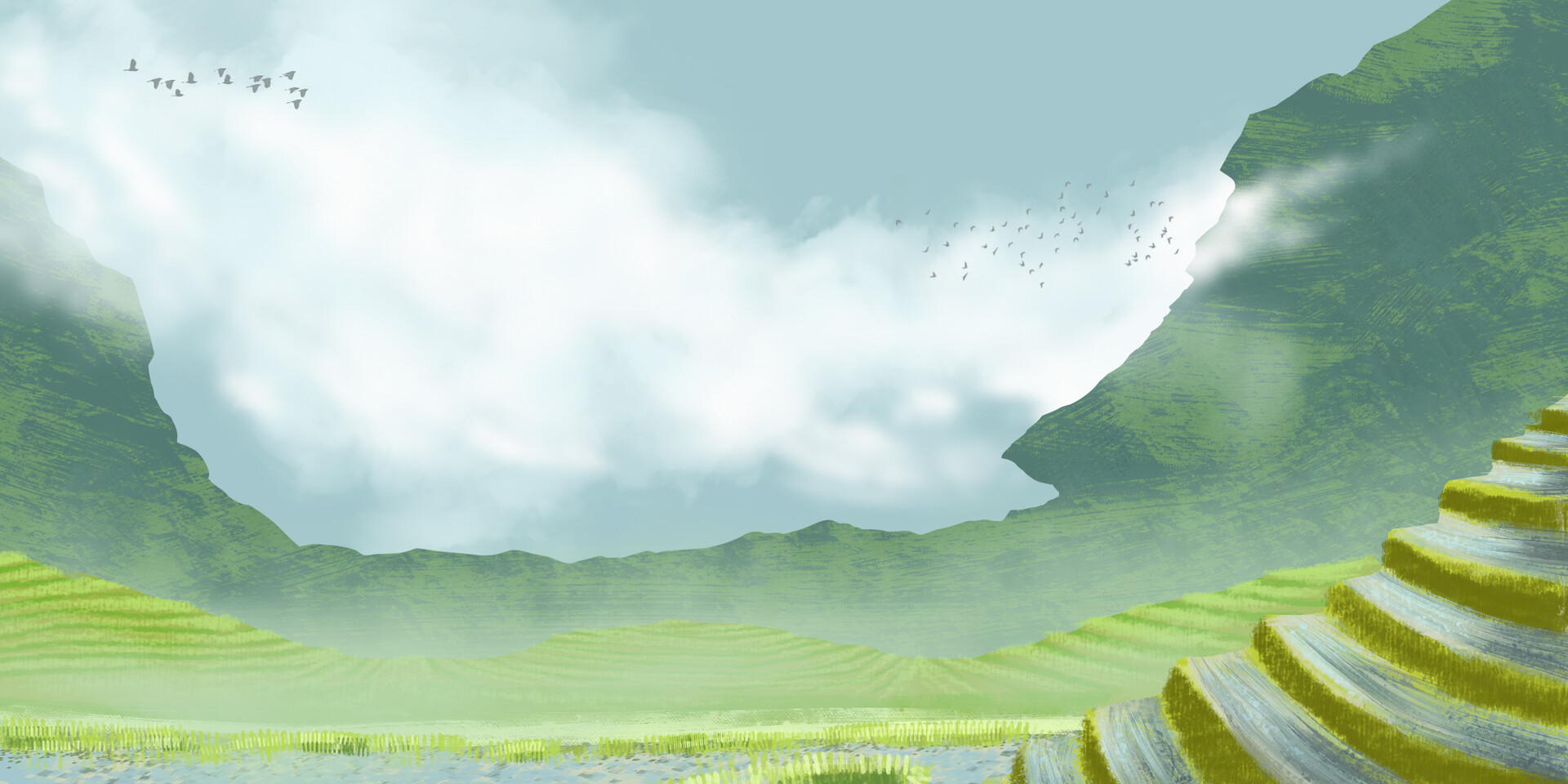
Hreelcii Isles, the Riverlands of Irtressi, on a hill overlooking the rice fields of Tamrat.
Nothing could quite beat the morning sunrise in the riverlands - the gentle buzz of insects echoing off of wetland trees; the sweet song of waking birds harmonising with the river’s rush; the gentle kiss of sunbeams on the early river fog; nowhere on Leligi could one find equal unity of natural phenomena into such a blessed whole. Tarik gosa Lencho aba Ifa aba Moti absorbed it all with every sense, feeding his nose and tongue with the warm, bitter sensation of freshly brewed coffee with grated sugarcane. In the paddies in the lowlands under the hill, the yeruzi were warming up their throats for the long song. Moti regarded the sky - the inken heavens were dancing eagerly today; it was a sign that the crops would grow properly today. There it started, the low, soft rumble of a hundred voices all across the rice fields, a reverence of the spirits in the mud and water, of the fish and birds in the paddies. Moti would wake up early every morning to witness this event: the world song rang out from the singers’ throats and the water and its inhabitants responded - fish picked lice off of rice stalks; the mud itself spat out weeds and had the water wash them ashore. They would be gathered and cooked along with fish and bananas and be served to the poorest in the city at the soup kitchen every morning. Meanwhile, the rice would be left to grow uninterrupted, allowing for a whole three harvests per year. The farmer’s song was an ancient technique among the Tamrat and its use had allowed their people to prosper for generations. Moti shuffled on his pillow so that he could look further up the hill behind him - there, his eyes followed the cobbled path up to the coffee, vegetable and cereal farms on the plateau, flanking all sides of Great Tamrat. He had another slurp of his coffee and waved his hand slowly through the air. A tapestry at his side weaved itself a little longer, threads interconnecting beautifully into images and letters.
“Nephew, your father summons you,” came a sudden call, and Moti nearly caught his coffee in his throat as he had heard neither steps nor breathing. He coughed madly and turned to regard his aunt Gadise, signalling with his hands that he would be right over once he’d gotten control of his cough. Aunt Gadise flashed him a smirk and then blinked down at the cooing babe wrapped around her chest. She gave her scaled cheek a soft caress and played with its fin-like ears, inciting gleeful giggles from her before moving on, picking up a basket full of clothes and moving down towards the rivers. Moti finally wrested command of his throat, chugged down the rest of his luke-warm coffee, took the tapestry and jogged off from his spot under the willow tree. His father’s estate was nothing short of magnificent, as one would expect of the head of the Tarik Clan: It was almost its own village, consisting of six lavish huts for all his brothers’ families and four lesser huts for servants and soldiers.

The whole village was built around a central plaza on which had been built the family jengo, the great obelisk tomb of the Tarik Clan wherein the remains of all ancestors had been stored for at least six generations.

Before the obelisk was an altar overflowing with gifts of gold, silver, figurines of people and animals, fabrics, pearls, fruits, spices, weapons and armour, all fogged over with a thick blanket of incense from smoking braziers. Moti stopped before the altar, put his palms together, bowed once, knelt down, let his forehead kiss the ground, stood up and bowed again, and then continued to a grove of trees some ten metres away from the obelisk. Under the grove of three trees sat four men atop colourful pillows, small tables in front of them with steaming food and cups of fresh coffee. The men were serviced by both slaves and family, and all of them expressed a most daunting authority that could only be matched by that of each other. Upon seeing Moti, the man in the middle nodded for him to approach the centre of the circle. “Ah, Moti, my son… Come here.”

Tarik gosa Sisay aba Lencho aba Ifa was stern by nature as though he had been a father from birth. He wore simple clothing today, a jaguar skin over his left shoulder and a green, red and yellow linen kilt was all he needed on a summer day such as this one; around his neck, he had several charms with bones and figurines to the many gods, the largest of which was a small human face with reptilian features and half-nelven ears. He gave his scaly neck a passive itch, blinked a pair of reptilian eyes at his son and asked, “How are you doing today, my boy?”
Moti waited patiently for one of the servants to roll out a beautifully patterned carpet for him, at which point he knelt down on it, brought his forehead to the ground, sat back up and answered, “Good father, I am very well today, thank you for asking.”
Ifa nodded approvingly. “Good. What have you been doing this morning?” The other men in the circle regarded Moti as well, sipping their coffee and picking on occasion pieces of food with their fingers to eat.
“I was watching the yeruzi in the paddies, good father - listening to their song, admiring their bond with the water and mud.” One of the servants came over to him with a small table that resembled more of an upside-down box with a tri-coloured, zig-zag-patterned tablecloth, topped it with a cup and poured it half-full of coffee. After the servant had poured, Moti picked up the cup with his right hand, sipped it once and put it back down. “I have been noting down their behaviour and rituals for my book, in fact.”
“Ah, yes, your book - do tell how that is going, my boy,” Ifa continued politely and beckoned over one of his daughters, whispered something to her and then refocused his attention on Moti. Moti smiled.
“Of course, good father. I have already catalogued the planting process from earlier in the spring - Zinabi Garungasa came so soon, after all, so the yeruzi could start earlier as well. In fact…” He took the tapestry he had brought along out from under his arm and rolled it out. The yellow background hosted pictures of meadows in shades of blue and green, populated thickly with dancing spirits atop water commanded by sitting sages. The tapestry was as long as two men were tall, and detailed descriptions next to the pictures explained thoroughly the processes of worldsong rice farming from planting to weeding to fertilising to irrigating, as well as treatment of the fish, birds and insects in the paddies. The people in the circle leaned in to get a closer look, nodding their amazement at the work. Ifa clapped approvingly, but without the vigour of his diction.
“That is splendid work, my boy. Your asimena has improved considerably since last year. How much more do you have left?”
Moti rolled the tapestry back up. “Just the harvest and fallowing of the paddies, unless I am mistaken. I also hope to include some stories from the yeruzi as well - something about their experiences and connections to the spirits.” He quieted down once he saw Ifa wag a finger warningly.
“Now, now, your eagerness is most admirable, my boy, but you know the law - only the ye Bontu may speak with the yeruzi, and unless you choose to accept the Bontenya’s daughter’s hand in marriage, you will never be able to speak to them.”
Moti blinked. “Has, has the Bontenya offered--”
“A joke, my boy,” snickered the father. The other men and some of the family members serving them joined in the laughter. Moti chuckled along politely, though his face couldn’t hide a shade of disappointment.
“O-of course, good father.”
Ifa’s smile faded and he lifted his cup, took a sip, put it back down and kept his eyes on his son as a daughter came to fill it up. “As much as I would like to talk pleasantries for the rest of the day, my boy, there is a reason I have called you here. I take it you are keen to know.”
Moti nodded. “Yes, good father. What do you wish of me?”
“It is not just of you, my boy - it is for all your brothers and cousins. However, as my eldest son and heir, you speak for them all, and thus you should know first so you may pass the message on.”
Moti frowned with concern and nodded slowly. “Of, of course, great father.”
“Do not flinch now, my boy. Remain stoic and stalwart if you are to inherit my seat.”
Moti flexed his muscles and sat up straighter, his face like stone. “Yes, great father.” Ifa nodded approvingly.
“Well, then, let us begin. A messenger came from the Bontenya’s palace today: Ekitili is dead.”
Moti recoiled in shock. “The warlord?”
“That’s right. The royal meklits all had a simultaneous vision sent by the Many Eyes in the Sky. His rule is no more, which means that the Bontenya believes the time has come.”
Moti blinked. “The… Time?”
“Indeed,” nodded Ifa. “I’m afraid your book will need to wait, my boy. The Bontenya has summoned every clan to Great Tamrat for a war council. He believes this is the opportunity the Wise Kings of the Past have been waiting for - the chance to lay all of Irtressi under Tamrat.” He paused brieflyto take a small pancake from a clay plate, pack it with some meat and vegetables from another plate and put it in his mouth. After swallowing, he continued, “What I need you to do is to gather your brothers and cousins, share with them these news and then send them to your uncle Desta. He has already journeyed off to establish a foothold and altar on the Lulit. Tell them to bring plenty of meat and chum for the crocodiles and jaguars. The last thing we want is tumultuous waters in war.”
Moti made a quick mental note. “Yes, great father. Is there anything else you wish of me?”
“There is, actually. While you and your uncle establish the warfront, you will be the only tenikwayi there. The rest of us are needed in Great Tamrat for Keni Yenigusi aba Bontenya.”
Moti swallowed. “Shouldn’t, shouldn’t I be there as well?” But Ifa waved dismissively.
“The Yenigusi aba Bontenya will understand. We cannot very well allow our warfront to be without the assistance of magic. However, just in case you are attacked before we can get there…” He nodded at one of the slaves, who brought over a gilded lidded basket to Moti. She placed it down on the ground before him, lowered herself to the ground along with it and slowly lifted the lid without looking into the basket. Moti gasped.
“G-great father, are you sure I can--”
“You will not use it frivolously, is that clear? It is a gift from the Bontenya himself and will be treated as such. If anyone in that camp sees it except for you and your uncle, be it stranger or brother, you are to execute them on the spot, do you understand me?”
Moti swallowed again and had the slave lower the lid onto the basket again. “Yes, great father. I… Understand.”
“That’s my boy. Now run along and tell your brothers and cousins to prepare. Me and your uncles here must ready ourselves to go to Great Tamrat.” With that, he and the three other men stood up. Instantly, the servants and family members hastened to clean up, dress them more properly and offer them basins of water in which to wash their faces and hands. Moti did the same and three servants came over to him respectively carrying a water basin, a clean cape and his barineta, dressing him as he washed himself. Once finished, he was handed his trusty bronze dagger, sheathed in a jade-speckled length of leather, and turned to his father once more.
“Alright, great father. I am off, then. May you and my uncles be at the best of health until we see each other again.”
“And to you, my boy,” said the patriarch and tugged his clothes into place. “Be safe out there, and do not let anyone see inside that basket.” With that, he walked off with his three brothers and almost all the servants and family in the village. The slaves carried chests and baskets full of gifts of grain, meat and metals, and Moti was left pretty much alone. Not quite alone, though - he heard voices coming from outside the estate walls. He tugged at his own cape and moved himself to the exit. As the eldest and heir of the clan, only he was permitted to speak to the patriarch in his fellow sonfolk’s stead. He never warmed up to that sort of pressure - on the occasions where he had misspoken or gotten some message wrong, his brothers had been the ones to be punished for it. Yes, in the eyes of the law, he could do nothing wrong, but all eyes were upon him, watching his every move and mistake. He halted by the corner of the exit, preparing himself quietly. He cleaned out his nose, tugged his clothes into place one more time and adjusted his hat as perfectly as he could. Then he rounded the corner and lifted his right hand in greeting.
“Brothers and cousins - the Hundred Rivers collect and bring us together on this occasion. I bring news from Our Father, brought onto him from the Bontenya, brought onto him from the Many Eyes in the Sky.” Around him gathered both eagerly and lazily a crowd of boys and men between the ages fourteen and twenty-five. Twenty-five in total, they were the sum of Ifa and his brothers’ kin, as well as spawn of other clans that had been adopted into the Tarik clan - a man as affluent as Ifa would have been considered greedy and selfish had he not taken in children of other clans; he himself had sent many a brother and sister of Moti to the other families of Tamrat.
A man five years Moti’s senior bent the knee. It was his cousin, Tarik gosa Lencho aba Lishan aba Workneh, a man destined to serve as Moti’s right hand in time. The bond between them flickered only with the smoulder of politeness that was considered the bare necessity between a patriarch and his close kin. Neither had made much effort to change this, despite their relationship going back over a decade. Still, neither could afford to lose face for selfish reasons such as rivalry, so Workneh knelt all the same and said, “The Thirteen Lakes flow into one as we gather to greet our master, Ifa aba Moti. The ancestors listen in anticipation - what word brings the son of the master of masters?” With Workneh’s pledge of servitude, the others followed, the internal hierarchies falling in place as the closest kin spoke for the furthest, the elders spoke for the younglings, and the fullbloods spoke for bastards and adoptees. Moti regarded them briefly and pondered who among them knelt for him and who knelt for his rank. He dismissed the thought and spoke,
“The Singing Warrior odes a call to battle, my kin. The tyrant Ekitili is dead, meaning the Itumasa are in disarray. It is known to all of us that Ekitili never spawned an heir - his eggs never saw the light of day on account of his weakness and impotence as a man. His decades of devastation wrought upon our kin and the kin of our kin shall be repaid in blood and bone. The Wise Kings of the Past decree it must be so - the Bontenya will unite all of Irtressi under Tamrat.” He scanned the faces of his audience. “We have been ordered by Our Father to bring arms and don armour and sail our canoes to the mouth of Lulit, where we are to meet with Lencho aba Desta. There, we will establish a warfront and wait for Our Father there. Any questions?”
One of the youngest, a lad by the name of Tarik gudi Gudina aba Dejen aba Dejen, whispered something to another boy next to him; that boy then shuffled over to Workneh and whispered something similar to him, and then Workneh spoke, “The youngest ask why we are going ahead - why does not Our Father travel with us?”
“Our Father must travel to Great Tamrat for Keni Yenigusi aba Bontenya - doing one’s duty to the ancestors comes first always, even before battle and glory in war. For what do we fight for if not to honour the wishes of those that came before us?”
Nods of agreement rippled throughout the elders in the crowd; the youngers seemed more aversive. Moti paid them no mind and continued, “The order has been given. Go to your huts and don your armour and grab your weapons. We leave at sundown.”
“Understood!” With that, they all returned home to prepare. Moti had his servants remove his long, white cape and armour him with a finely woven grassteel harness around the lower chest and belly, with another circular collar to protect his shoulders and upper chest. They gave him dexterous linen pants and packed them tightly into a pair of shin protectors, also grassteel-made, to serve as protection against waterborne parasites and leeches. On his feet, he put on agile sandals with frilly bottoms, made for allowing good grip on slippery surfaces while simultaneously exposing the feet to the open air to ward off fungal diseases that would thrive in closed off boots. Finally, they gave him a red cape - a symbol of the warpath - and a red barineta - denoting the rank of leader.
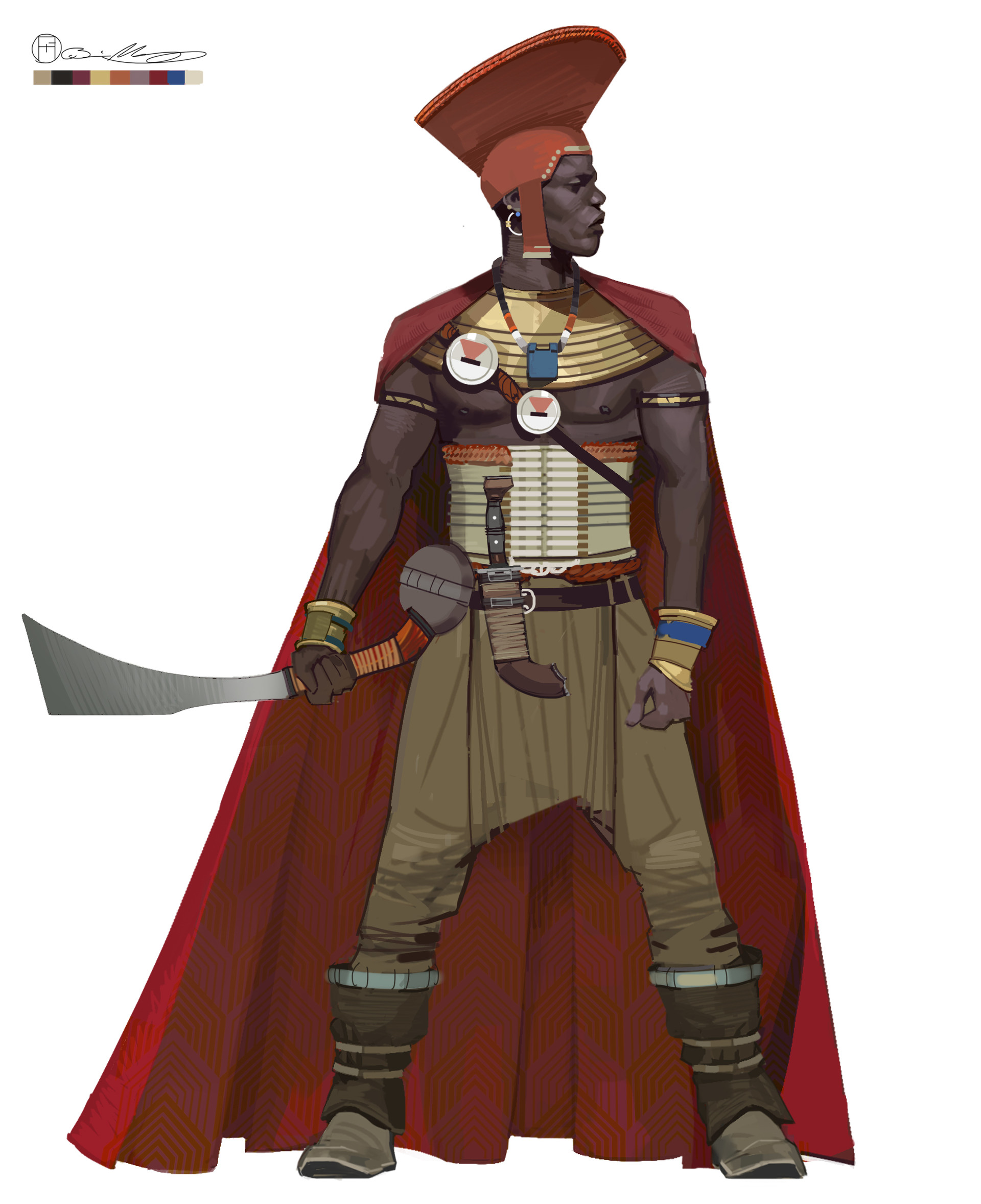
Once fully clad, he brought along his dagger, a water flask and a longer, flat-headed machete and headed outside. His followers had likewise prepared, all of them wearing grassteel imported from the reef lands by the Delta, armed with spears, blades and axes of bronze and bows with grassteel arrows. Behind Moti, servants carrying carcasses of slaughtered animals and pots of fresh blood followed in a line. Moti offered Workneh, his second in command as evidenced by his white barineta, a confident nod and led the way to the jengo to offer their prayers to the clan ancestors before departure. Moti offered the altar before the towering tomb one of the pots of blood and a shank of pork and spoke,
“Blessed aba Tarik - today, we will begin the work for your dream of old: The Itli will no longer enslave and pillage your sons and daughters. Today, the legacy of Ekitili will end. Please bless us with your guidance and wisdom so this may come to pass.” Then, as one, the men put their palms together, bowed once, knelt down, let their foreheads kiss the ground, stood up and bowed again, and then journeyed down to the canoes. There were four canoes in all, each capable of seating nine men. The twenty five warriors spread throughout all of them, the rest of the spots being filled with servants carrying equipment and goods or rowing. After leaving the first offering of blood and meat on the altar to the local crocodiles, they sailed off down the river. Moti had brought along his father’s gift, the basket with the secret content. He used is as a stool at the far back of the canoe from where he steered and kept watch. Reaching the Lulit would take the whole evening - he would have much time to plan.
© 2007-2024



